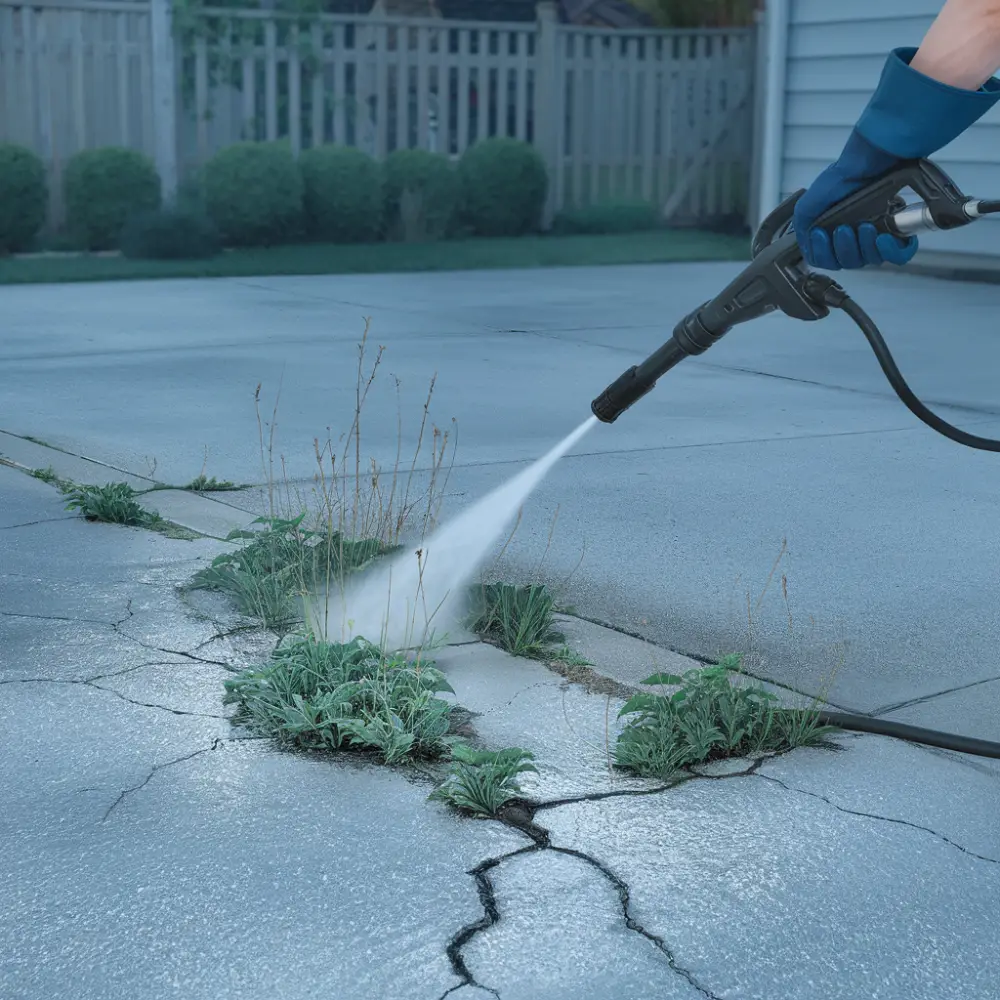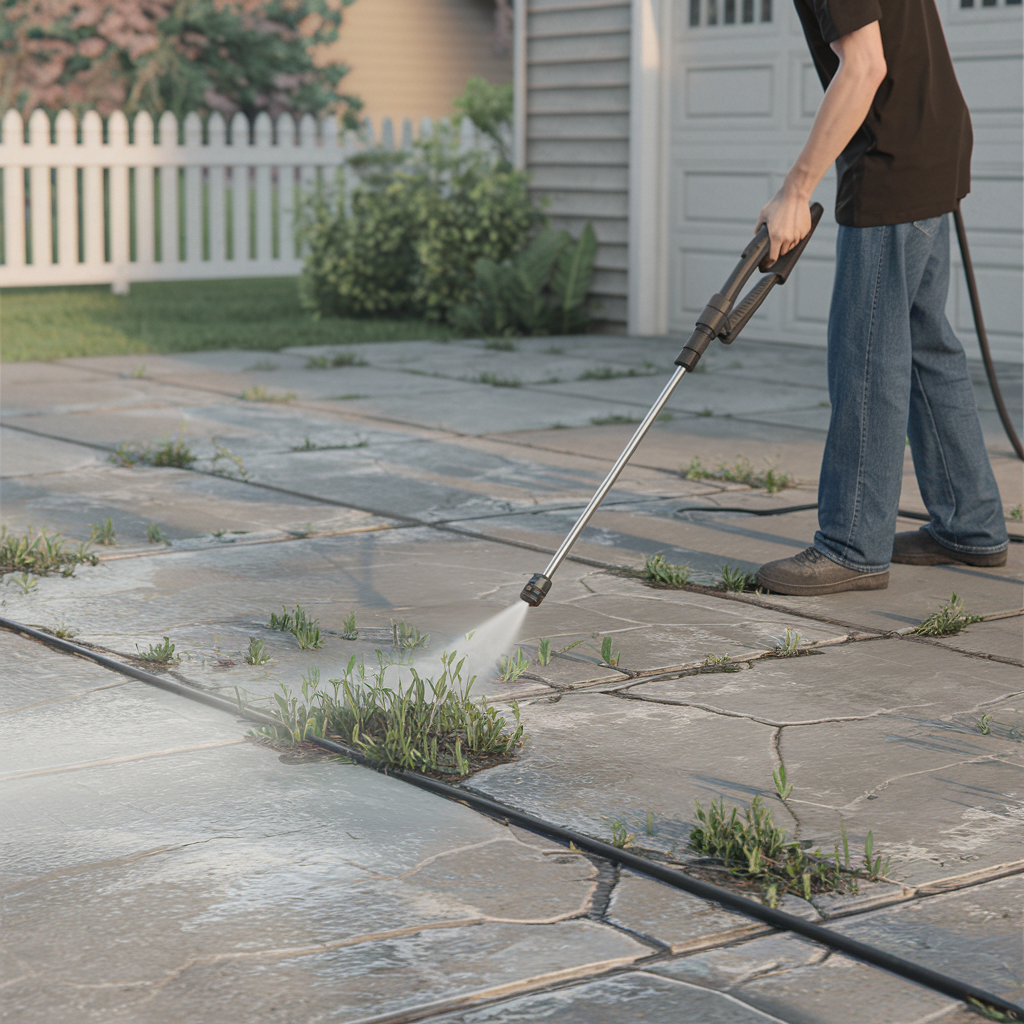No, putting store bought weed killer in a pressure washer aerosolizes the chemicals responsible for killing plants, causing a health hazard for humans in the process. But is there another way to utilize your pressure washer to kill weeds?
- Why You Should Never Use Synthetic Herbicide in a Pressure Washer
- A Safer Alternative: Homemade Eco-Friendly Weed Killer
- Hydro-Tilling: Using a Pressure Washer to Uproot Weeds
- Should You Use a Pressure Washer to Remove Patio or Driveway Weeds?
- Final Verdict: Best Way to Use a Pressure Washer for Weed Control
Can You Put Herbicide in a Pressure Washer?
Thinking about loading your pressure washer with weed killer? Bad idea. Spraying store-bought herbicide through a high-powered washer can turn dangerous fast. The chemicals in products like Roundup become airborne, creating a major health risk for you and your neighbors. But that doesn’t mean your pressure washer can’t help in the fight against weeds—there are safer, more effective alternatives.
Why You Should Never Use Synthetic Herbicide in a Pressure Washer
Commercial herbicides, especially those containing glyphosate (the active ingredient in Roundup), are designed to be applied in controlled ways. Here’s why using them in a pressure washer is a bad idea:
- Health Risks: Pressure washers operate at high PSI levels, aerosolizing liquid solutions. This means you could be inhaling toxic chemicals, which can lead to serious respiratory and skin issues.
- Environmental Damage: When sprayed under high pressure, herbicide particles can travel far beyond their target, contaminating nearby plants, soil, and even water sources.
- Reduced Effectiveness: Herbicides are designed to be absorbed by plants over time. Pressure washing spreads them too thinly, reducing their potency.
If you want to apply synthetic herbicides safely, stick with a hand-pump sprayer. A simple pump sprayer lets you control the application without turning your yard into a hazardous zone.

A Safer Alternative: Homemade Eco-Friendly Weed Killer
You don’t have to ditch the pressure washer completely. A simple homemade herbicide can work effectively without harming your health. This DIY weed killer uses everyday household items and is safe for both humans and pets:
DIY Pressure Washer Weed Killer Recipe
- 1 gallon white vinegar (5% acetic acid)
- 1 cup table salt
- 2 tablespoons liquid dish soap
How It Works:
- The vinegar’s acetic acid dries out weeds by breaking down their cell walls.
- The salt dehydrates the plant and prevents regrowth.
- The dish soap helps the mixture stick to weeds for longer-lasting effects.
How to Apply It Safely:
- Pour the mixture into your pressure washer’s detergent tank.
- Use the soap or detergent spray setting to apply it evenly over weeds.
- Avoid spraying directly on soil where you plan to grow plants, as salt can prevent future growth.
- Rinse out the pressure washer with water after use to prevent corrosion.
Important Note: Some gardeners opt for higher concentrations of acetic acid (10% or more), but this can cause skin and eye irritation. Stick with 5% for safe use.
Hydro-Tilling: Using a Pressure Washer to Uproot Weeds
A lesser-known method for weed control is hydro-tilling, which uses the force of a pressure washer to remove weeds at the root. Here’s how it works:
- Method: Hold the pressure washer nozzle about 6 inches from the weeds and spray at a downward angle.
- Effectiveness: This loosens soil and disrupts root systems, making it easier to pull weeds manually.
- Downside: This method can spread seeds, leading to future weed growth. To counteract this, follow up with a salt-and-vinegar spray to prevent regrowth.
Best for: Large, dense weed patches where pulling by hand would take too long.
Should You Use a Pressure Washer to Remove Patio or Driveway Weeds?
Weeds in driveways and patios are a common nuisance, and many homeowners blast them away with a pressure washer. But should you?
✔ OK to pressure wash weeds growing through natural cracks in solid concrete driveways.
❌ Avoid pressure washing weeds between pavers, bricks, or slabs—it can wash away the sand or mortar that holds the structure together. Instead, use a salt-and-vinegar spray to kill weeds while preserving the integrity of your patio.
Final Verdict: Best Way to Use a Pressure Washer for Weed Control
- Never use synthetic herbicides like Roundup in a pressure washer due to health and environmental risks.
- Use a DIY vinegar-based herbicide for an organic, safe alternative.
- Hydro-tilling can help uproot weeds, but it works best when combined with a weed killer.
- Be cautious when pressure washing patio weeds to avoid damaging the surface.
If you’re dealing with a major weed problem, a large pump sprayer is the safest way to apply powerful synthetic herbicides. But if you want an eco-friendly approach, your pressure washer can still be a useful tool—just make sure you’re using it the right way.

